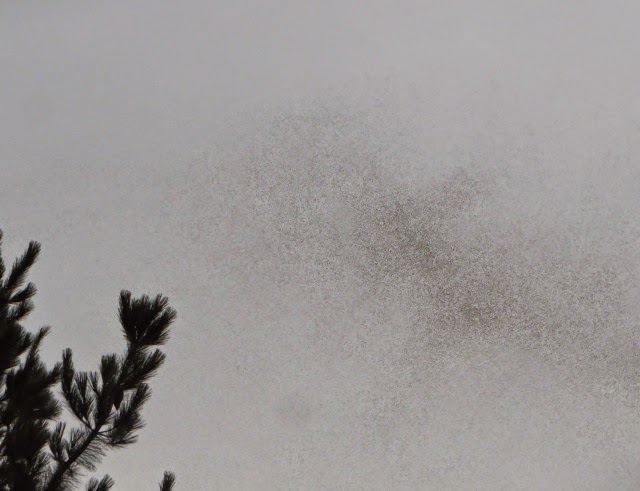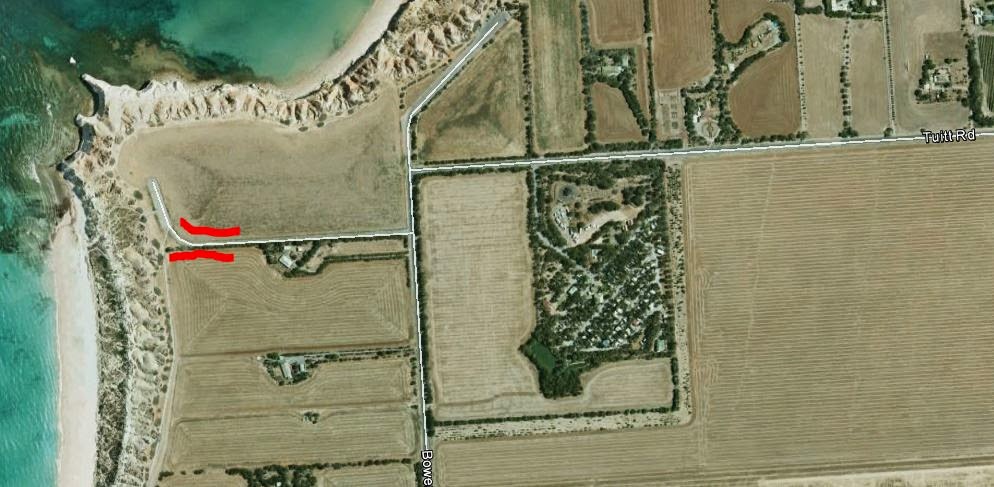Always something good!
After out third outing today Frances commented that even if we don't find what we set out to see we often find something interesting and/or exciting. And so it was today.
The day began with a strange blueish light, as thoug the humidity was very high. Nothing - including rain - came of this.
Towards the end of out dog walk to the fishing platform I noticed a larger black and white cormorant on another jetty. On checking it turned out to be a Pied Cormorant. These were very common at Dutton Bay earlier in the year but this was the first of this species I have seen here. I went back a little later and took photos of the 4 species of Cormorant at the site.
Little Pied Cormorant - looks like a fluffy puppy. Note yellow bill.
Great Cormorant: all black with a patch of yellow skin beside the beak. The other bird is a species new to science the Headless Cormorant.
When the head is revealed it includes a long ivory coloured bill. This is diagnostic of a Pied Cormorant. When the front of the body is seen it is a much sleeker appearance than the Little Pied. I sometimes say they look more like King Penguins.
So that was something nice and unexpected. The 4th species, Little Black Cormorant is Little and Black (including the bill).
After finishing off breakfast we went back to Bastion Point to what I could do in the way of a list of waders for World Shorebird Day. The tide was well out.
Possibly as a result of the low water level dredging was happening.
A small pool on the edge of the rocks was inhabited by a rather active Hermit Crab in a triton shell. It was about the largest Hermit Crab I have seen: almost a mini-lobster!
Out on the sand bank of the Inlet we found a good array of beach mice (our name for the small plovers which scamper around like small rodents). The first photographed was a Double-banded Plover.
The commonest were Red-capped Plovers.
At times the two species were together.
Out in the middle of the Inlet terns were evident. The two big jobs are Caspian Terns (there appeared to be 4 hanging around the area at present) while the modest sized one was one of about 100 Crested Terns.
Surprisingly, despite the mouth of the Inlet still being closed the water level appears to go up and down with the tides. It must be leaching through the dune. On the sea side of the closing-dune a patch of sea life was being washed up. Some photos follow.
This football sized rock was coated with sponge. Not a good idea to kick it.
Pale lilac sponge/jelly with small green algal growth.
No idea what this was, but the spines looked a tad unpleasant.
Another hermit, above the tidemark.
Perhaps when/if it gets out it will be able to walk back into the water.
Having just read about Captain Cook mistaking a cloud for Point Hicks I wondered if this was an example of the sort of cloud that caused the problem. I shall refer to clouds in this situation as Point Hicks clouds from now on.
We have never noticed this magnolia in the past. (The house in the background has been described to us in the past for the interesting red woodwork.)
A close up of the magnolia.
While I doing stuff lower down the block Frances spotted, from the kitchen window, a Bassian Thrush in the garden bed just outside,
Our final outing of the day was to the Gun Club track, expecting to see various grassland/heath birds. However the only birds we saw in a 2.5km drive were 3 Pied Currawongs! The Epacris flowers were rather tired, but there lots of these mauve ones.
We stopped off at Betka Beach to walk the loop track starting off alone the Betka River. This has been a good area for orchids in the past and so, relatively speaking, it was today. I think this is Bunochilus tunstallii.
A Maroonhood: I will take a punt on Pterostylis oblonga, although the image doesn't show the galea which is the distinguishing feature.
Pterostylis nutans - Nodding Greenhood.
A bolete fimgus.
I think this is a Common Prettymouth fungus - Calostoma fuscum.
The day began with a strange blueish light, as thoug the humidity was very high. Nothing - including rain - came of this.
Towards the end of out dog walk to the fishing platform I noticed a larger black and white cormorant on another jetty. On checking it turned out to be a Pied Cormorant. These were very common at Dutton Bay earlier in the year but this was the first of this species I have seen here. I went back a little later and took photos of the 4 species of Cormorant at the site.
Little Pied Cormorant - looks like a fluffy puppy. Note yellow bill.
Great Cormorant: all black with a patch of yellow skin beside the beak. The other bird is a species new to science the Headless Cormorant.
When the head is revealed it includes a long ivory coloured bill. This is diagnostic of a Pied Cormorant. When the front of the body is seen it is a much sleeker appearance than the Little Pied. I sometimes say they look more like King Penguins.
So that was something nice and unexpected. The 4th species, Little Black Cormorant is Little and Black (including the bill).
After finishing off breakfast we went back to Bastion Point to what I could do in the way of a list of waders for World Shorebird Day. The tide was well out.
Possibly as a result of the low water level dredging was happening.
A small pool on the edge of the rocks was inhabited by a rather active Hermit Crab in a triton shell. It was about the largest Hermit Crab I have seen: almost a mini-lobster!
Out on the sand bank of the Inlet we found a good array of beach mice (our name for the small plovers which scamper around like small rodents). The first photographed was a Double-banded Plover.
The commonest were Red-capped Plovers.
At times the two species were together.
Out in the middle of the Inlet terns were evident. The two big jobs are Caspian Terns (there appeared to be 4 hanging around the area at present) while the modest sized one was one of about 100 Crested Terns.
Surprisingly, despite the mouth of the Inlet still being closed the water level appears to go up and down with the tides. It must be leaching through the dune. On the sea side of the closing-dune a patch of sea life was being washed up. Some photos follow.
This football sized rock was coated with sponge. Not a good idea to kick it.
Pale lilac sponge/jelly with small green algal growth.
No idea what this was, but the spines looked a tad unpleasant.
Another hermit, above the tidemark.
Perhaps when/if it gets out it will be able to walk back into the water.
Having just read about Captain Cook mistaking a cloud for Point Hicks I wondered if this was an example of the sort of cloud that caused the problem. I shall refer to clouds in this situation as Point Hicks clouds from now on.
We have never noticed this magnolia in the past. (The house in the background has been described to us in the past for the interesting red woodwork.)
A close up of the magnolia.
While I doing stuff lower down the block Frances spotted, from the kitchen window, a Bassian Thrush in the garden bed just outside,
Our final outing of the day was to the Gun Club track, expecting to see various grassland/heath birds. However the only birds we saw in a 2.5km drive were 3 Pied Currawongs! The Epacris flowers were rather tired, but there lots of these mauve ones.
We stopped off at Betka Beach to walk the loop track starting off alone the Betka River. This has been a good area for orchids in the past and so, relatively speaking, it was today. I think this is Bunochilus tunstallii.
A Maroonhood: I will take a punt on Pterostylis oblonga, although the image doesn't show the galea which is the distinguishing feature.
Pterostylis nutans - Nodding Greenhood.
A bolete fimgus.
I think this is a Common Prettymouth fungus - Calostoma fuscum.
So we end up back at the start: we set out on our final outing expecting to see birds and dipped completely but instead saw our first lot of orchids for the season!


































Comments